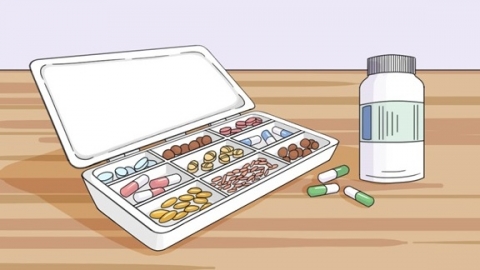What foods should not be consumed with grapes?
Under normal circumstances, grapes are a nutritious fruit, but attention should be paid to their combination with certain foods and medications to avoid adverse reactions. Foods to avoid include milk, seafood, lemon, radish, and animal liver. Medications to avoid include nifedipine tablets, fluoxetine hydrochloride capsules, warfarin sodium tablets, atorvastatin calcium tablets, and ethinylestradiol cyproterone acetate tablets. Detailed explanations are as follows:

I. Foods to Avoid
1. Milk
The fruit acids in grapes can react with proteins in milk to form coagulated masses that are difficult to digest, affecting protein absorption. Consuming them together may cause symptoms of indigestion such as bloating and diarrhea.
2. Seafood
The tannins in grapes can combine with proteins in seafood to form substances that are difficult to digest, affecting protein utilization. Seafood typically contains high levels of purines, and consuming it together with grapes may increase the risk of gout.
3. Lemon
Consuming grapes together with acidic foods like lemon may increase gastric acid secretion, leading to stomach discomfort. People with gastric diseases such as gastric ulcers or gastritis should especially avoid consuming them together.
4. Radish
Grapes contain large amounts of plant pigments. When consumed together with radish, they may produce substances that inhibit thyroid function after digestion and decomposition in the gastrointestinal tract, potentially inducing goiter.
5. Animal Liver
Animal liver is rich in protein. When combined with tannins and fruit acids in grapes, it may produce adverse reactions similar to those when consumed with seafood. The copper and iron in animal liver may combine with vitamin C in grapes, possibly affecting the absorption of nutrients.
II. Medications to Avoid
1. Nifedipine Tablets
Some components in grapes may interact with nifedipine tablets, causing excessively rapid or low blood pressure. Consuming them together with nifedipine tablets may increase the risk of hypotension, causing symptoms such as dizziness and fatigue.
2. Fluoxetine Hydrochloride Capsules
Some components in grapes may affect the metabolism and excretion of fluoxetine hydrochloride capsules, prolonging the drug's retention time in the body. Consuming them together may increase drug side effects, such as headache and nausea.
3. Warfarin Sodium Tablets
Some components in grapes may enhance the effect of warfarin sodium tablets, increasing the risk of bleeding. Consuming them together with warfarin sodium tablets may lead to symptoms such as gum bleeding and subcutaneous bleeding.
4. Atorvastatin Calcium Tablets
Some components in grapes may affect the metabolism and excretion of atorvastatin calcium tablets, increasing drug concentration. Consuming them together may increase drug side effects, such as muscle pain and abnormal liver function.
5. Ethinylestradiol Cyproterone Acetate Tablets
Some components in grapes may interfere with the metabolism and excretion of oral ethinylestradiol cyproterone acetate tablets, reducing contraceptive effectiveness. Consuming them together may increase the risk of unintended pregnancy.
When consuming grapes, attention should be paid to avoiding the above foods and medications to ensure good health. If you have any concerns or discomfort, seek medical advice promptly and consult a professional physician.








